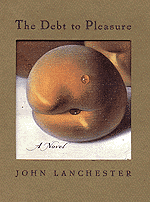
John Lanchester's Debut Novel 'Is Not A Conventional Cookbook.'
By Rebecca Cook
ENGLISHMAN TARQUIN WINOT, the erudite narrator of John
Lanchester's novel The Debt To Pleasure (Henry Holt &
Company), possesses a staggering knowledge of all things culinary.
 Pontificating on everything from the Judeo-Christian roots of
serving spring lamb for Easter dinner to the proper method for
salting caviar, Winot pulls from an inexhaustible reservoir of
food wisdom which will surely delight gastronomes everywhere.
Pontificating on everything from the Judeo-Christian roots of
serving spring lamb for Easter dinner to the proper method for
salting caviar, Winot pulls from an inexhaustible reservoir of
food wisdom which will surely delight gastronomes everywhere.
But there is more going on in this novel than mere exposition
about the pleasures of gourmet dining. Lanchester begins his book
with the words, "This is not a conventional cookbook...."
Truer words were never spoken.
In his debut novel, Lanchester, an editor and former restaurant
reviewer for the London Observer, has put together a fascinating
portrait of a man driven by corresponding passions for food and
a bizarre philosophy of art that reveres absence over the creation
of something new.
Using the vehicle of seasonal menus, Winot makes tangential leaps
in telling his own life story.
A description of Irish stew leads to a detailed reminiscence
of a childhood maid and nanny. Assorted family tragedies and funerals
are recalled in where and what Winot ate afterwards. The pleasures
of eating wild game evoke the story of his relationship with elderly
gun-toting neighbors in the south of France, Jean-Luc and Pierre,
whose penchant for shooting the local wildlife inevitably leads
to disaster.
It's a mesmerizing recitation of events and impressions and all
readers, particularly those with a profound fondness for food,
will be amused by Winot's culinary references as a way of describing
all aspects of life.
In contemplating the architectural merits of a cathedral
he's visiting, Winot explains his understanding of proportion
as demonstrated in one of his favorite libations.
 "For myself, I learned all I needed to know about the
rules of proportion from the dry martini," he tells us. "The
law is: main ingredient (gin), subordinate ingredient (vermouth),
and grace note (lemon twist, olive). This is the law of proportion
and rhythm that underlies all of the plastic arts, from cocktail-making
and cooking to architecture, sculpture, pottery, and dressmaking.
Remember where you heard it first."
"For myself, I learned all I needed to know about the
rules of proportion from the dry martini," he tells us. "The
law is: main ingredient (gin), subordinate ingredient (vermouth),
and grace note (lemon twist, olive). This is the law of proportion
and rhythm that underlies all of the plastic arts, from cocktail-making
and cooking to architecture, sculpture, pottery, and dressmaking.
Remember where you heard it first."
No less quirky is Winot's rather unconventional view of art
as not merely less is more but less is less.
It isn't what an artist does that is noteworthy but what
he or she chooses not to do, Winot tells an interviewer interested
in writing the biography of Winot's brother, a renowned sculptor.
"The artist lives with an idea, inhabits it, probes
it, tests it, until he comes to the reason why it is impossible--and
then, surely, he has understood it more fully, he has in the strongest
sense created it more fully, than his less intelligent doppelganger
who fatally and carelessly makes the naive, of course charming,
but still moronic error of actually committing his thoughts to
paper, or canvas or the pianoforte."
It is clear that Winot considers himself to be an artist of this
unusual school of thought, but how he manifests his art is a mystery
painstakingly unraveled as the novel progresses. The reader's
burgeoning awareness that Winot's wit and erudition is perhaps
symptomatic of something more than overbearing pretentiousness
emerges gradually and creates a sense of the sinister.
To say any more would spoil a good read.
This is Lanchester's first novel, and a promising beginning it
is. Not only was I entertained, but I learned hundreds of new
adjectives to describe the pleasures of the culinary arts. For
that alone, I am deeply indebted.

|
